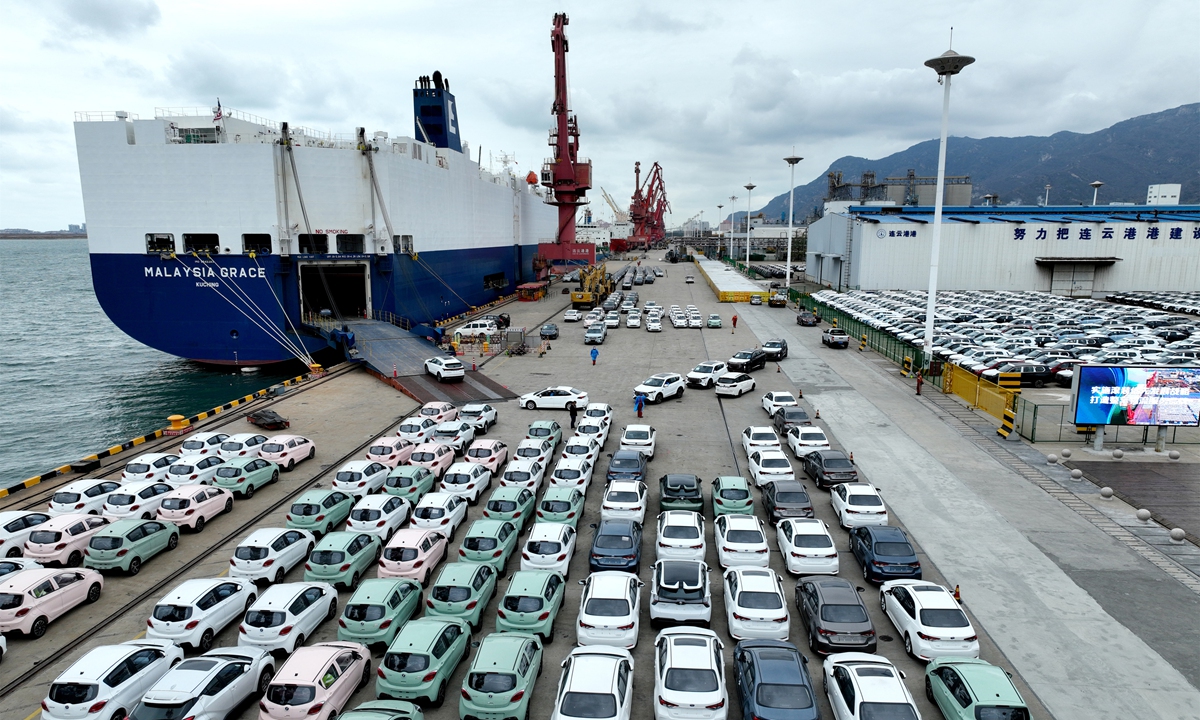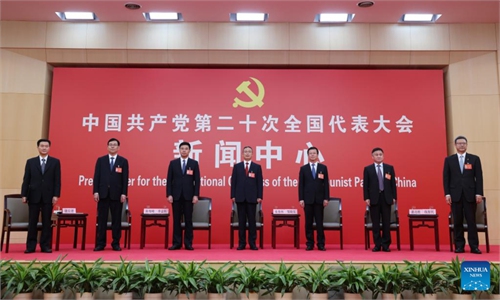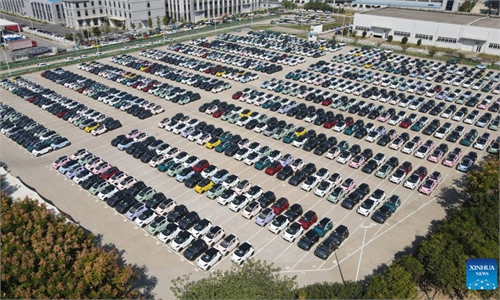US grills major automakers on Xinjiang-linked supply chains in fresh instance of denialism amid continued hostility toward China

Cars for export are loaded onto a roll-on/roll-off ship at Lianyungang Port, East China's Jiangsu Province, on November 18, 2022. Photo: IC
The US Senate Finance Committee on Thursday grilled eight major automakers on supply chain links to alleged "forced labor" in Northwest China's Xinjiang Uygur Autonomous Region, in a fresh defiance of China's repeated rebukes on Xinjiang-related rumor-mongering.
Washington is habitually turning to groundless human rights claims to justify its interfer-ence in normal business operations, experts said, blasting the latest instance of denialism as a continuation of US hostility against China.
In letters made public on Thursday, US Senate Finance Committee Chair Ron Wyden ques-tioned eight major automakers over their supply chain links to Xinjiang-sourced materials.
"Unless due diligence confirms that components are not linked to forced labor, automakers cannot and should not sell cars in the United States that include components mined or pro-duced in Xinjiang," Wyden wrote.
The eight automakers from the US and other countries are Ford, General Motors (GM), Tesla, Honda, Toyota, Mercedes-Benz, Volkswagen and Stellantis. All of them were asked to provide the requested information no later than January 13.
Tesla, Stellantis, Honda, Toyota, Mercedes-Benz and Volkswagen did not respond to Global Times' requests for comment as of press time. The other two automakers could not be immediately reached for comment.
GM said Thursday that its supplier contracts forbid the use of any "forced or involuntary labor, abusive treatment of employees or corrupt business practices in the supplying of goods and services to GM," according to Reuters.
The Senate letters came after a December report by the Helena Kennedy Centre for International Justice at Sheffield Hallam University that claimed the eight firms singled out in the Senate grilling, among other major automakers, had several supply chain exposures to Xinjiang.
The report was the latest of a string of Xinjiang-related reports from the British university over the past two years that put Xinjiang sectors ranging from cotton and solar panels to polyvinyl chloride in its crosshairs.
The Senate's questioning is yet another instance of US interference in normal business op-erations, Cui Dongshu, secretary general of the China Passenger Car Association, told the Global Times on Friday.
There's no such thing as forced labor and human rights infringement in Xinjiang, where business operations are in compliance with laws and regulations, Cui said, denouncing the Senate questions as a malicious attempt to set up roadblocks to China's economic development.
The US has routinely resorted to using various excuses to contain the rise of Chinese new-energy vehicles as part of a wider clampdown on Chinese technologies, Jia Xinguang, an independent auto analyst, told the Global Times on Friday.
"Automobile supply chains simply do not take shape overnight," Jia stressed, noting that the latest intimidating action targeting automakers not only from the US will likely prove futile in bringing together a unified force against China.
The Senate letters were apparently sent in defiance of repeated Chinese official remarks lambasting the US, which has turned a deaf ear to the reality in Xinjiang.
At a regular press conference on December 6, Foreign Ministry Spokesperson Mao Ning stated that the US legislation on Xinjiang is based on lies and has seriously disrupted normal China-US trade in photovoltaic products.
"It violates market laws and international economic and trade rules, and undermines the stability of the global photovoltaic industrial and supply chains as well as the global action on climate change. It will eventually backfire and hurt the US' own interests," the spokesperson said.
China's commerce ministry has also awakened rumor-mongers to the fact that Chinese laws clearly prohibit forced labor, and residents of all ethnic groups in Xinjiang are completely free and equal in labor and employment, with their labor rights and interests effectively protected by related laws, and their living standards constantly improving.


